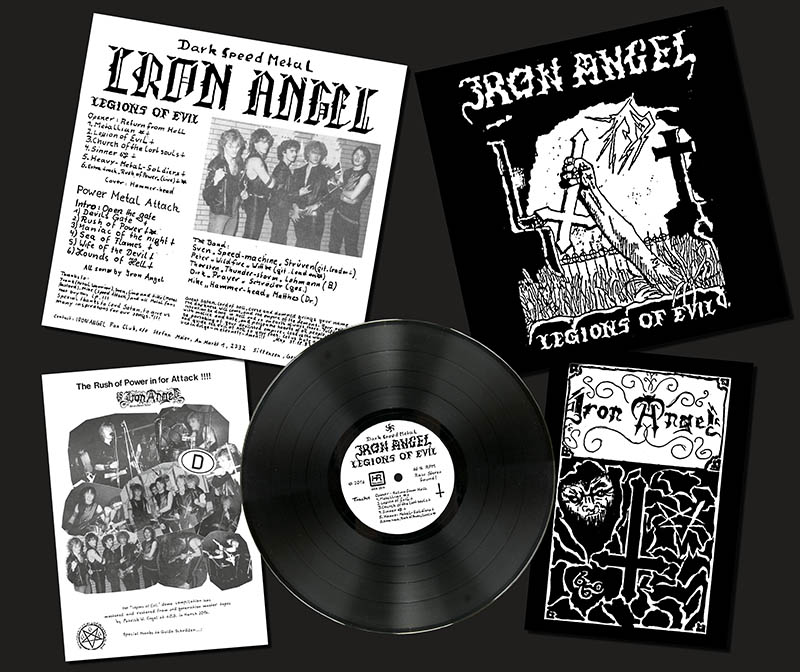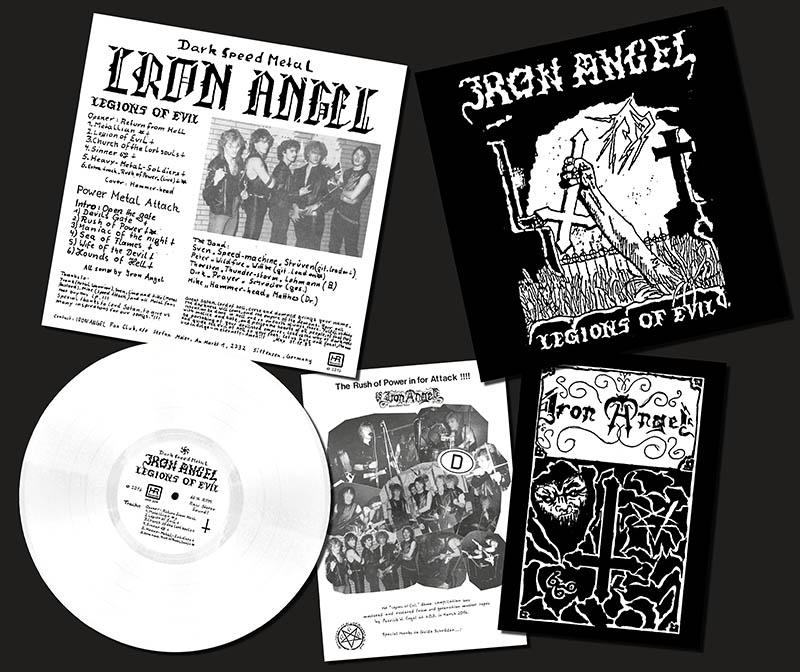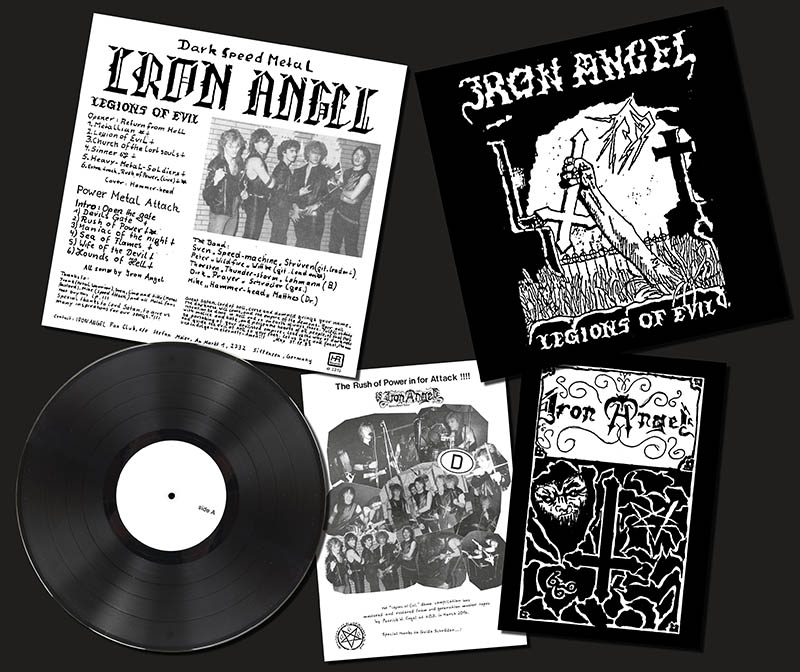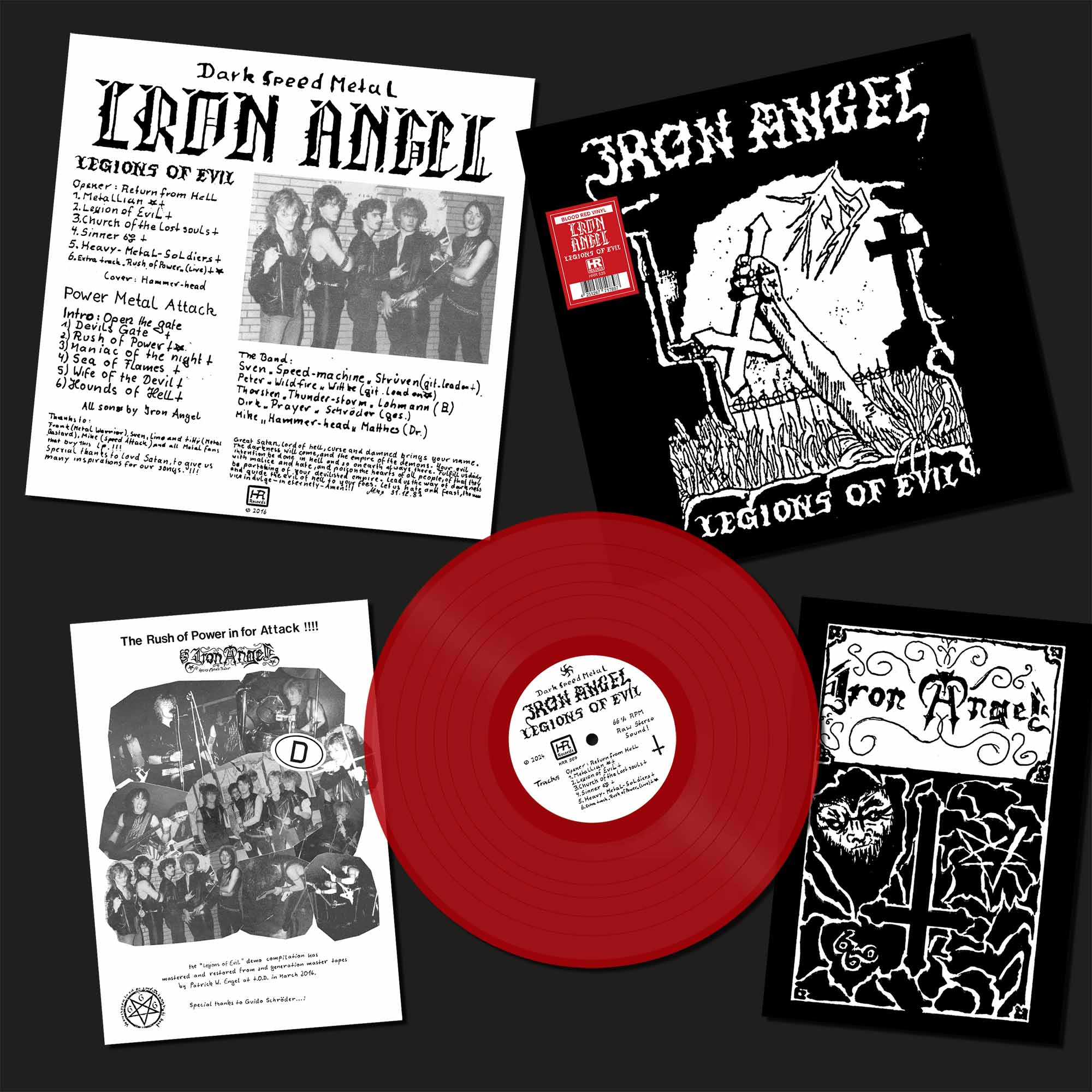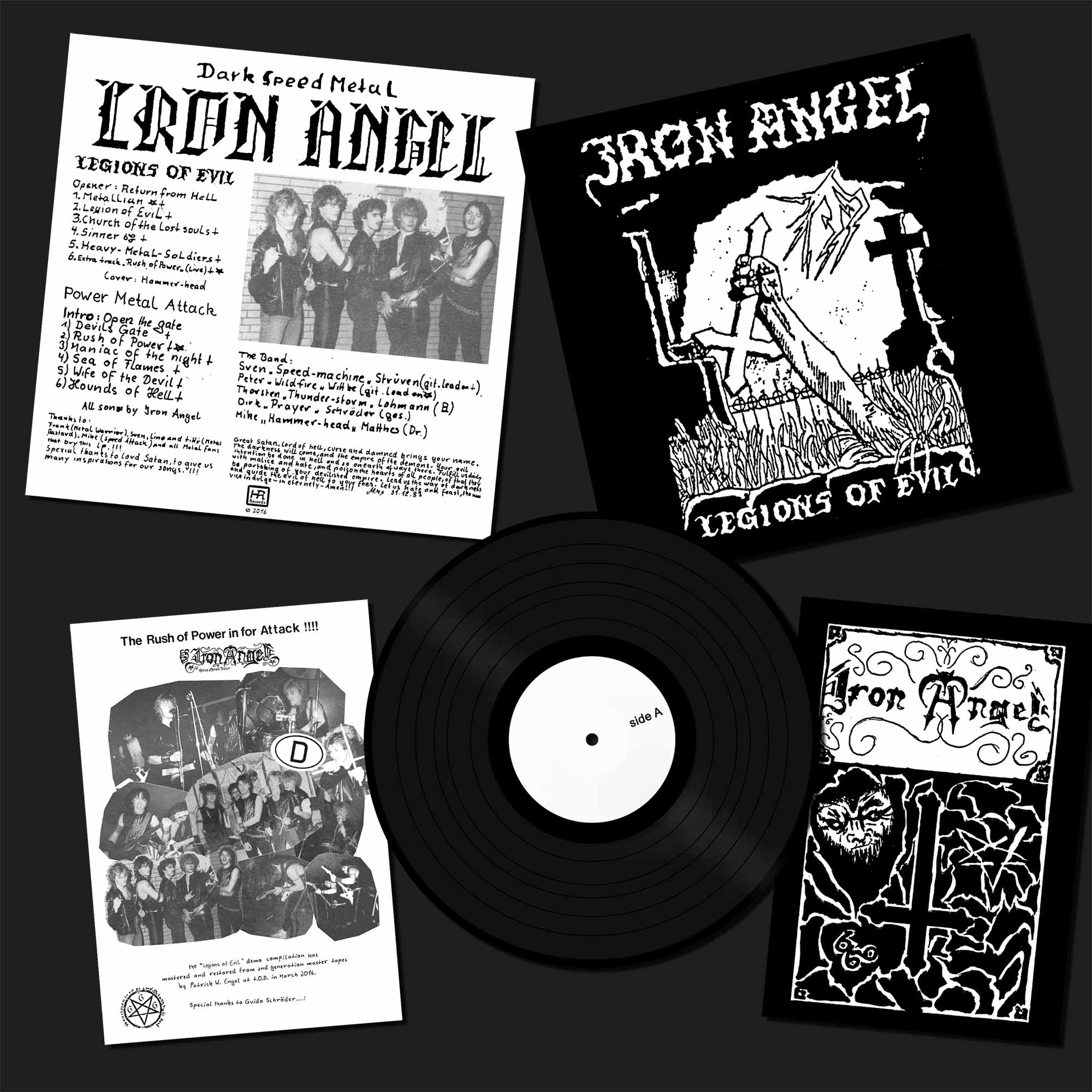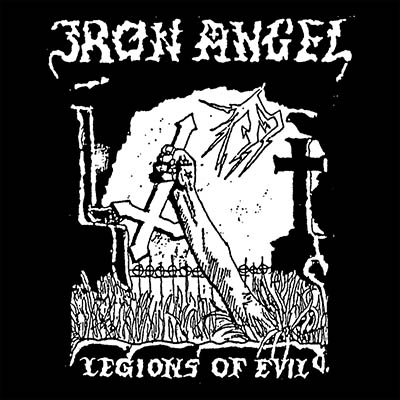 | ||||
| IRON ANGEL - Legions of Evil LP | |
HRR 507, ltd 500, 250 x black + 250 x white vinyl, cardboard cover with reverse side print, A4 cardboard insert, 2nd pressing: 300 x transparent blood red vinyl, 425gsm heavy cardboard cover, A4 insert printed on uncoated paper | |
| Dirk "Prayer" Schröder - Vocals Sven "Speed-machine" Strüven (R.I.P. 2008) - Guitars Peter "Wildfire" Wittke (R.I.P. 2000) - Guitars Thorsten "Thunder-storm" Lohmann - Bass Mike "Hammer-head" Mattes - Drums | |
| Legions Of Evil 01 Return from Hell 02 Metallian 03 Legions of Evil 04 Church of the Lost Souls 05 Sinner 666 06 Heavy Metal Soldiers 07 Rush of Power (Live Power Metal Attack 08 Intro - Open the Gate 09 Devil's Gate 10 Rush of Power 11 Maniac of the Night 12 Sea of Flames 13 Wife of The Devil 14 Hounds of Hell | |
| 1st pressing: SOLD OUT! 2nd pressing: AVAILABLE | |
“Speed Metal made in Germany”, that is what you get from Iron Angel. Formed in 1980, the legendary outfit from Hamburg first started out as a school band under the moniker "Metal Gods" (after the song by Judas Priest, of course), mainly playing their favourite mix of KISS, Motörhead, Priest and other (mostly English) heroes; but with the advent of Power Metal, and influenced by artists such as Running Wild, Avenger, who late turned into Rage, and Helloween, the young band began to walk a darker, heavier path and also decided on a new name: "Iron Angel", allegedly inspired by a novel about a spirit hunter. Vocalist Dirk still remembers how that decision came about, though he doesn’t recall all the details: “We thought that ‘Iron Angel’ fit our new, harder style a lot better than the old name, but to be frank, I don’t remember where we got it from – you know, it really is a long time ago.” Back then, Iron Angel’s greatest influences were, of course: “Priest! Later on we also started listening to other cult bands like Venom and Slayer, who definitely have helped shape our own signature mix of different styles.”
The two demos “Legions of Evil” and “Power Metal Attack” were both released in the same year, in 1984. What are the most memorable things that come to Dirk’s mind when he thinks of those two releases? “Working together with Peter and Sven was by far the most memorable thing for me. It was not so much about writing one song after the other; the most important thing was the friendly, emphatic way we listened and responded to each other. I will never forget you, guys.“ Iron Angel’s guitarist Peter "Piet" Wittke who also played bass in the Hamburg-based Thrash Metal outfit Roots died in a car accident in 2000.
Guitarist Sven Strüven who played in Iron Angel from 1983-1987 passed away in 2008.
Now in what way do the two demos differ from one another? As one followed the other so very quickly, had there any development taken place in between the two? No, says Dirk: “Not really, maybe we had gotten a bit better at playing our instruments, but that’s basically it. We just played what came to our mind, we didn’t really try to fit into any box. We simply recorded all the stuff we all thought was great.”
Releasing a first (and second) demo usually brings about some changes for a young band, and Dirk tries his best to recollect all the things which happened back then, a good 32 years ago: “I’m sorry, but, you know, after all this time it’s not so easy to remember every little thing. One thing that happened is that SPV got interested in us; another thing was that we suddenly had our own supporters’ club, and that we got mentioned in a couple of fanzines. All at once we were sent to Berlin where we would then record our debut album ‘Hellish Crossfire’. Everything happened all at once and at an incredible speed.”
Looking back, how does Dirk see Iron Angel’s own role in the 80’s Speed Metal scene? Isn’t it justified to say that they belonged to the pioneers of German Speed Metal? He agrees on that one: “Yes, with regard to Germany I think you could call us something like pioneers. I’m still in touch with some old comrades from those days (Hello Schmier!).”
Even if it is a long time ago, Dirk tries his best to remember the process of writing and recording the two demos: “We recorded the demos with, well, NO EQUIPMENT AT ALL. Four mics, one band reverb and a four-track cassette tape recorder. It was basically just pressing the record button, 1,2,3,4 and go! And on top of that, we actually recorded both demos in the adjoining room of a church! We were really lucky, because the pastor didn’t speak any English ;-).”
Some people say that Iron Angel at first gained a lot more recognition abroad than at home, and one also hears that they instantly made a lot of fans in the States while it took a bit longer to gain some recognition at home. But Dirk denies this: “No, it wasn’t really like that. Our old label SPV for sure distributed our debut album in the States, but it all really started in Germany.”
Even though Iron Angel started out very promisingly, they never managed to gain the same amount of recognition as e.g. Running Wild, Destruction etc. This is all the more strange as the German Rock Hard Magazine described the young band as outstanding musicians (compared to the rest of the scene), with a singer whose voice was really unique, and with the ability to write songs that were both hard and catchy at the same time. They even counted Iron Angel among Germany’s most promising newcomers. But even so, Dirk isn’t bitter about anything: “I think we simply drifted apart somehow. One wanted this, the second wanted that and so on. One of us even wanted to become a cook, rather than being a musician, and so he just quit. Another member suddenly thought that RATT was the raddest thing on earth, and that was that. I personally have been called a lot of things, and someone from Metal Hammer even went so far as to say I was the ‘Halford of Speed Metal’. I think that’s funny. I just sing the way I want to, basta!”
For the cover artwork of the High Roller release, Iron Angel commissioned the airbrush artist who already did the cover art of the first two releases: “Yes, we actually managed to get in touch with him (Hello Uwe, great that you’re still alive!). He also did a cover artwork for Helloween, and who knows, perhaps he would also like to do another one for us – that would be awesome!”
Dirk is also very happy that Iron Angel’s first two efforts have been taken care of by High Roller: “Yes, absolutely. I appreciate the high level of transparency which really helps to create a lot of trust and which is the best foundation for working together on equal footing. There are many, many assholes in the music business who sell all the crap they can get hold of just to make a couple of bugs, and the artists never see a single penny. Bands are literally being destroyed by such dipshits, and the fucking internet then does the rest… I think the most important thing is that a record label really digs the stuff it releases!” No doubt about it, we do dig Iron Angel!
Ulrike Schmitz
